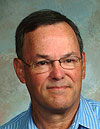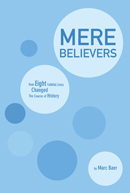William Wilberforce defined Christian as “a pilgrim travelling on business through a strange country.” — Marc Baer

Through his presence at and presentations for a number of InterVarsity Graduate and Faculty Ministry gatherings, it has been my privilege to get to know Marc Baer, Professor and Chair of the Department of History, Hope College (Holland, MI). As such, it was with great enthusiasm I took up the opportunity to read his Mere Believers: How Eight Faithful Lives Changed the Course of History (Eugene: Cascade, 2013) for the Emerging Scholars Network.
To offer an inside scoop to Emerging Scholars, I asked Marc a few questions regarding the inspiration, format, and intended purposes of Mere Believers. Note: As with previous interviews, I take full responsibility for the related pictures and links.

Tom: Marc, I’m excited to learn about Mere Believers: How Eight Faithful Lives Changed the Course of History. Please share with Emerging Scholars why you wrote Mere Believers.
Marc: Tom, two decades ago I heard a piece on the poet W. H. Auden on the Mars Hill Audio Journal. Even though I had used his poetry in a modern British history course I taught, I didn’t know he was a Christian. So I began thinking about a book that would tell the story of significant modern Britons—the society I’ve been studying for 45 years—who were believers. In particular, because I came to Christ a few weeks after passing my Ph.D. comprehensive exams I’ve always been intrigued about adult converts. So I narrowed the focus of the project to such people. Because I teach a general education senior seminar at Hope called Exploring Faith and Calling I was also interested in revealing how my subjects discerned what work they were to do; and because it’s my sense that the new atheists haven’t bothered to carry out any historical research I wanted to show what positive cultural consequences resulted from my subjects coming to Christ. Finally, I had never before written anything for a general audience, and I wanted to try my hand at that.
Tom: Anything else that would be helpful to know about the format of Mere Believers?
Marc: Each chapter of Mere Believers tells the story of one individual who lived between the mid-18th and mid-20th centuries—except for one on a couple, i.e., Oswald and Biddy Chambers. Some of my eight are well known, William Wilberforce or G. K. Chesterton, for example. Some need to be well known, the countess of Huntingdon or Hannah More to take two cases. They are male and female, black and white, rich and poor; they are English, Welsh, Scots and an African immigrant; and they represent a variety of Christian traditions. Each chapter begins with some background, then tells the story of the subject’s conversion experience and subsequent calling, and finishes with their achievements.
Tom: Getting back to the big picture, what three or four points do you desire every reader to take away from Mere Believers?
Marc: For readers who are not Christians, I’d like them to understand how much of the modern world’s thinking about human rights and human dignity, about social justice and freedom resulted from individuals whose Christian convictions were followed by action. I’d like them to take the church out of history and ask, as honestly as they can, what our world would be like.
For readers who are believers, we need to know our own story better than I’m afraid we do. We stand on the shoulders of giants who, like us had faults as well as faith. But because they went beyond the cultural roles and personal problems dealt to them their lives reveal how our choices might define us rather than our experiences.
For all readers, I want to explore what happens to hearts and minds after Christian conversion.
Tom: Marc, to wrap up, please tell us a little more about your vision as a professor of history of the next generation of followers of Christ Jesus walking in the footsteps of those who have gone before them.
Marc: In his book The Two Tasks, Charles Malik argued that “It is communion with others across the ages that is more sorely needed today than even communion with others in our time.” Why? Because as Thomas à Kempis believed, “On the Day of Judgment we shall not be asked what we have read, but what we have done.” I can’t possibly say it better than that.
Tom: Amen! Marc, Thank-you! for in the inside look. I am really appreciating Mere Believers: How Eight Faithful Lives Changed the Course of History. The Emerging Scholars Network will be giving more attention to Mere Believers (and resources available on your website) in the coming weeks. May God richly bless your teaching, research, writing, and administrative labors. To God be the glory!
Editor’s note: Don’t miss the book review written by Jennifer Woodruff Tait for The Well and Surrounded by “Mere Believers” — an experience at the 2014 Ancient Evangelical Future Conference hosted by Trinity School for Ministry.
7/4/2014 (9:20 am): Added links to book reviews. 11/6/2015 (4:23 pm): Various edits.
Tom enjoys daily conversations regarding living out the Biblical Story with his wife Theresa and their four girls, around the block, at Elizabethtown Brethren in Christ Church (where he teaches adult electives and co-leads a small group), among healthcare professionals as the Northeast Regional Director for the Christian Medical & Dental Associations (CMDA), and in higher ed as a volunteer with the Emerging Scholars Network (ESN). For a number of years, the Christian Medical Society / CMDA at Penn State College of Medicine was the hub of his ministry with CMDA. Note: Tom served with InterVarsity Christian Fellowship / USA for 20+ years, including 6+ years as the Associate Director of ESN. He has written for the ESN blog from its launch in August 2008. He has studied Biology (B.S.), Higher Education (M.A.), Spiritual Direction (Certificate), Spiritual Formation (M.A.R.), Ministry to Emerging Generations (D.Min.). To God be the glory!

Leave a Reply